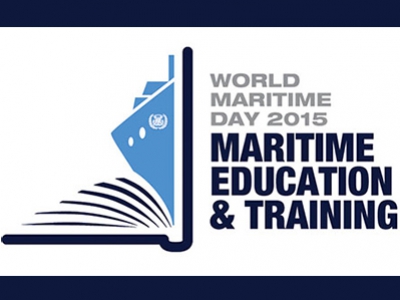‘Maritime education and training’ at WMU
IMO Secretary-General launches 2015 World Maritime Day theme: “Maritime education and training” at World Maritime University
IMO Secretary-General Koji Sekimizu has launched this year’s World Maritime Day theme, “Maritime education and training”, telling students and staff at the World Maritime University (WMU) that maritime education and training was essential for the long-term sustainability of the sector, both at sea and on-shore.
“Effective standards of training remain the bedrock of a safe and secure shipping industry, which needs to preserve the quality, practical skills and competence of qualified human resources,” Mr. Sekimizu said, adding that the 2015 World Maritime Day theme provided the opportunity to highlight the importance to everybody, not just within the shipping industry, of there being sufficient quantity and quality maritime education and training available to meet the sector’s needs, now and into the future.
“The 1978 STCW Convention and Code, as amended, has set the international benchmark for the training and education of seafarers. While compliance with its standards is essential for serving on board ships, the skills and competence of seafarers, and indeed, the human element ashore, can only be adequately underpinned, updated and maintained through effective maritime education and training,” he added.
Addressing the class of 2015 post-graduate students, who have begun their first semester at WMU, in Malmö, Sweden, Mr. Sekimizu said that the university was a cornerstone of global maritime education and training and a vital and integral part of the IMO family.
“At IMO, we are unique among UN agencies to have two affiliated educational institutions – the World Maritime University and the International Maritime Law Institute (in Malta). We are very proud of these and of the many graduates they have produced who now hold positions of responsibility and influence within the maritime community,” he said.
Without a quality labour force, motivated, trained and skilled to the appropriate international standards, the maritime industry cannot thrive. Not only that, but all the many advances that have been made, in terms of safety and environmental impact, are at risk if those at the “sharp end” are unable to implement them properly.
While seafarer training falls to training institutions recognized and authorised by national authorities to meet STCW standards, IMO as an organization supports skills-based training events and the sharing of technical knowledge, through national and regional Integrated Technical Cooperation Programme (ITCP) training events and workshops, which provide short up-grading courses, based typically on the IMO Model Courses.
On another level, the World Maritime University and the IMO International Maritime Law Institute are at the forefront of IMO’s capacity-building strategy, supporting post-graduate training in order to maintain a cadre of high level managers, policy makers and other key personnel.
While in Malmö, Mr. Sekimizu also made a site visit to the future home of WMU in Tornhuset, the centrally located, historic harbor master’s building that is being enhanced by a dramatic new addition designed by renowned architect Kim Utzon in collaboration with Tyrone Cobcroft of Terrior Architects (Australia). The new building will be inaugurated in May 2015.
| World Maritime Day |
|
The World Maritime Day theme provides a focus for year-round activities while the day itself is celebrated at IMO Headquarters and around the world in the last week of September. Since 2005, a formal parallel event has also been held, hosted by an IMO Member State. In 2015 the Parallel Event will be held in Japan. |
Source: IMO





























































